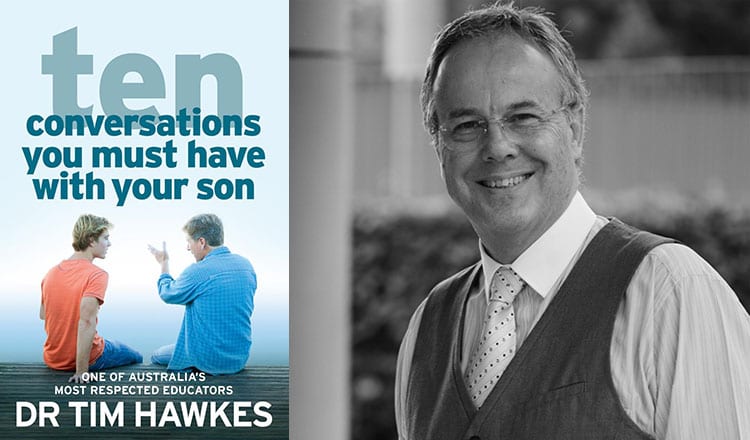Do you have a son? Then you need to read this. It gives parents a healthy heads-up guide and brilliant advice for tackling those tricky but essential parent-son conversations on life, values, sex and more…
Being a parent can be hard. But so can being a son – there’s a lot of life lessons and hurdles to jump. So as a parent, where do you start when trying to guide and teach your son about everything from religion and morals to sex and confidence? Dr Hawkes is the father of three, the headmaster of a boys’ school of 1600 students and one of Australia’s best known educators and was awarded an OAM (Medal of the Order of Australia) for his outstanding service to education and to professional organisations. He is also the author of several books including his latest, 10 Conversations you must have with your son. Here’s what he has to say about those essential conversations and writing his new book….
“I’ve had the most rewarding experience writing a book ’10 Conversations you must have with your son’ (Hachette, Australia).
Below are six of the conversations. My reason for not sharing all 10 is because I would really be interested in finding out your views on what the other conversations should be. I say this because your views are just as valid as mine.
My choices have been heavily influenced by being a father of a son, and headmaster of a boys’ school of 1600 students for the last 17 years. This also explains why I have limited the topic of my book to teenage sons.”
1. Telling our sons they are loved:
The world is not always an encouraging place. Our planet has animals that are red in tooth and claw, who are predatory and can cause a boy to feel unloved. Tragically, there exists some parents who do not love their sons. Some will say that they do, but there is no congruency between word and deed. Fortunately, most parents do love their sons, and demonstrate this love faithfully even when that love is seriously tested by bovine behaviour. A son needs at least one adult who adores him – preferably two. A son needs to know that he is a priority in someone’s life. A son needs to be loved and he also needs to know he is loved.
2. Helping boys find out who they are:
Many have little idea of their extraordinary ability. As a result, their unique talents remain undiscovered and their life is blighted by their potential never being realised. The teen years are years boys search for an identity that is their own, an identity that is independent of family, and possibly, even of friends. Too many boys are accidental in the formation of their faith, conviction and politics. Others are worse; they haven’t formed ideas about anything and seem content to drift through life unlabelled (often interpreted as a good thing) and uninformed (often seen as a bad thing). It is also important for a boy to know his history and ‘story’.
3. A boy needs guidance in morality:
What are the reference points for a boy’s behaviour? What will be the navigational markers he will use to navigate the world’s seas? There are many competing and even conflicting philosophies that beckon alluringly to him. What ones should he be guided by? There are many choices, including the secular philosophies associated with humanism, existentialism, utilitarianism, consequentialism and a lot of other ‘isms’. There are also divine directives to consider. There can be a temptation for parents to leave many of these choices to their offspring. This might be admirable if it were not for the fact that the son is then given no information to make his choice on this and other matters and the results can be tragic.
4. Our sons also need to learn how to live in a community:
Although some boys remain active and involved with society, there are a number that are lazy blobs. Entertained by a range of expensive electronic equipment, many sons are limiting their social interaction to a number of ‘e-relationships’. These relationships are often short-term, disposable and shallow. The exercise of social skills strengthens a community. If neglected, a boy can become self-centred and become a liability in society.
5. Sex and Intimacy:
The western world generally does a poor job in preparing its sons to be intimate. There are always exceptions, but in general, a son is required to navigate their way through the sexual swamp with minimal direction. The signposts that are given to him can be vague and contradictory. Parents say this and the school says that, but the porn site says something completely different. Where adult direction falters, peer direction takes over. The ‘leader of the sack’ can, in a boastful voice, suggest the way forward to the forbidden fruit in a manner that is not always helpful. The proper people to educate sons about sex are parents. Some parents are wonderful at giving their children guidelines on sex, whereas others are not so wonderful.
6. The ability to manage financial matters:
The level of ignorance in young people about financial matters can be frightening. This is revealed in the number of young people who get into financial trouble through an inability to budget, a failure to understand the traps associated with credit cards and an incapacity to retire debt. Too many are persistently living beyond their means, over-relying on parental assistance and making unwise choices when selecting hire-purchase options, mobile phone plans and leasing arrangements.
“Ok – if you were limited to three more topics of conversation to have with your teenage son, what would they be?
Of course, there are literally thousands of options, and all of them have to be adjusted so they are relevant and age appropriate. Nonetheless it would be great to hear what three you would add to the list above.
Finally, I would love to know how you would alter the list of 10 essential conversations if they were with your teenage daughter. I need all the help I can get, given that have 1601 sons but only 2 daughters!”
About Dr Tim Hawkes
Dr Hawkes is the father of three, Headmaster of the Kings School in Parramatta and one of Australia’s best known educators. He has been a Headmaster of leading schools for over 20 years and is the author of several books. A regular contributor to educational debate on radio and television, Dr Hawkes is frequently invited to be a speaker at conferences around the world.
Have you had these important conversations with you son? Tell us about your experience in the comments below.







